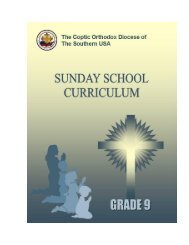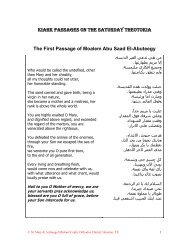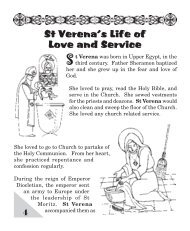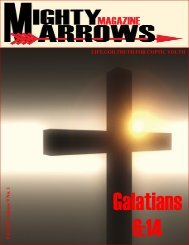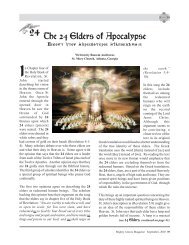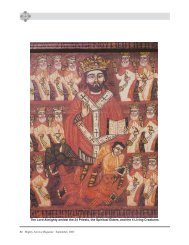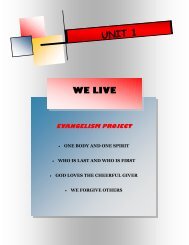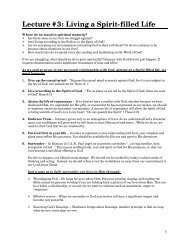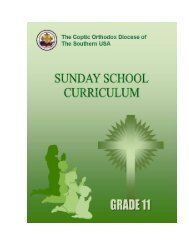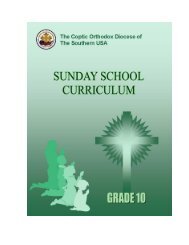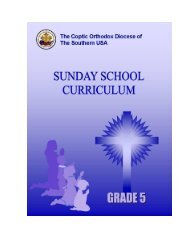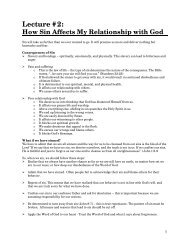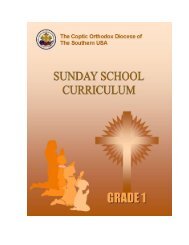Grade 12 - Coptic Orthodox Diocese of the Southern United States
Grade 12 - Coptic Orthodox Diocese of the Southern United States
Grade 12 - Coptic Orthodox Diocese of the Southern United States
You also want an ePaper? Increase the reach of your titles
YUMPU automatically turns print PDFs into web optimized ePapers that Google loves.
Sunday School Curriculum <strong>Grade</strong> <strong>12</strong><br />
impossibilities are not things but non-entities. Then, God cannot do anything that is logically<br />
impossible.<br />
God cannot do anything that is inconsistent with His Divine Nature and Character. For instance, to<br />
sin is to fall short <strong>of</strong> a perfect state. Hence, to be able to sin is to be able to be deficient, which cannot<br />
be reconciled with Divine Omnipotence. It is because God is Omnipotent that He cannot sin.<br />
• ―He [God] cannot deny Himself‖ (2 Tim 2:13)<br />
• ―It is impossible for God to lie‖ (Heb 6:18)<br />
• ―God cannot be tempted by evil‖ (Jam 1:13)<br />
The Problem <strong>of</strong> Evil and Pain:<br />
If God were good, he would wish to make His creatures perfectly happy, and if God were<br />
Almighty He would be able to do what He wished. But <strong>the</strong> creatures are not happy. Therefore,<br />
according to some, God lacks ei<strong>the</strong>r <strong>the</strong> goodness, or power, or both. This is <strong>the</strong> problem <strong>of</strong> pain and<br />
evil, in its simplest form. Can <strong>the</strong> presence <strong>of</strong> evil or suffering be reconciled with <strong>the</strong> Goodness <strong>of</strong><br />
God and His Omnipotence?<br />
God in His Goodness, created everything ―good‖ (Gen 1:<strong>12</strong>,25,31). Free will is a ―good‖ thing<br />
that God had granted to His creatures. Evil is <strong>the</strong> direct consequence <strong>of</strong> <strong>the</strong> misuse <strong>of</strong> freedom.<br />
Never<strong>the</strong>less, evil is temporal and ultimately goodness will prevail for ever, ―I saw a new heaven and<br />
a new earth, for <strong>the</strong> first heaven and <strong>the</strong> first earth had passed away‖ (Rev 21:1), and St. Paul said,<br />
―<strong>the</strong> creation itself also will be delivered from <strong>the</strong> bondage <strong>of</strong> corruption into <strong>the</strong> glorious liberty <strong>of</strong><br />
<strong>the</strong> children <strong>of</strong> God‖ (Rom 8:21)<br />
Divine Omnipotence and Goodness intervenes and changes evil into good. For instance, Joseph<br />
<strong>the</strong> Righteous said to his bro<strong>the</strong>rs, ―you meant evil against me; but God meant it for good, in order to<br />
bring it about as it is this day, to save many people alive.‖ (Gen 50:20). Indeed, ―all things work<br />
toge<strong>the</strong>r for good to those who love God‖ (Rom 8:28).<br />
Concerning pain and suffering, St. Paul said, ―I consider that <strong>the</strong> sufferings <strong>of</strong> this present time are<br />
not worthy to be compared with <strong>the</strong> glory which shall be revealed in us‖ (Rom 8:18). ―For our light<br />
affliction, which is but for a moment, is working for us a far more exceeding and eternal weight <strong>of</strong><br />
glory, while we do not look at <strong>the</strong> things which are seen, but at <strong>the</strong> things which are not seen. For <strong>the</strong><br />
things which are seen are temporary, but <strong>the</strong> things which are not seen are eternal‖ (2 Cor 4:17,18).<br />
Q: If God created everything “good” as it was documented in <strong>the</strong> Holy Book <strong>of</strong> Genesis, <strong>the</strong>n<br />
what is <strong>the</strong> meaning <strong>of</strong> <strong>the</strong> following verses: “I form <strong>the</strong> light and create darkness, I make peace<br />
and create calamity; I <strong>the</strong> Lord, do all <strong>the</strong>se things.” (Is 45:7) – “If <strong>the</strong>re is calamity in a city,<br />
will not <strong>the</strong> Lord have done it?” (Amos 3:6). Is calamity a “good” thing?<br />
A: First <strong>of</strong> all, <strong>the</strong> verse <strong>of</strong> Isaiah <strong>the</strong> Prophet is meant to emphasize <strong>the</strong> existence <strong>of</strong> ONE God,<br />
because some nations believed that <strong>the</strong>re were one god for evil and ano<strong>the</strong>r for good, ―That <strong>the</strong>y may<br />
know from <strong>the</strong> rising <strong>of</strong> <strong>the</strong> sun to its setting that <strong>the</strong>re is none besides Me. I am <strong>the</strong> Lord, and <strong>the</strong>re is<br />
no o<strong>the</strong>r; I form <strong>the</strong> light and create darkness, I make peace and create calamity: I <strong>the</strong> Lord do all<br />
<strong>the</strong>se things.‖ (Is 45:6,7)<br />
Secondly, both verses do not mean that God is <strong>the</strong> cause or <strong>the</strong> source <strong>of</strong> calamity but <strong>the</strong>y mean<br />
that no calamity occurs without God‘s permission. This is obvious from <strong>the</strong> story <strong>of</strong> Job <strong>the</strong><br />
Righteous where Satan was <strong>the</strong> cause <strong>of</strong> Job‘s calamities (by God‘s permission) yet Job said to his<br />
wife, ―shall we indeed accept good from God, and shall we not accept adversity?‖ (Job 2:10)<br />
considering <strong>the</strong> adversity as coming directly from God even though it was Satan‘s work.<br />
SEPTEMBER 199



